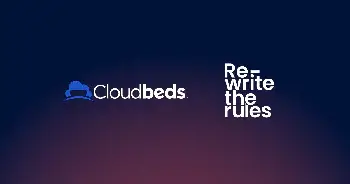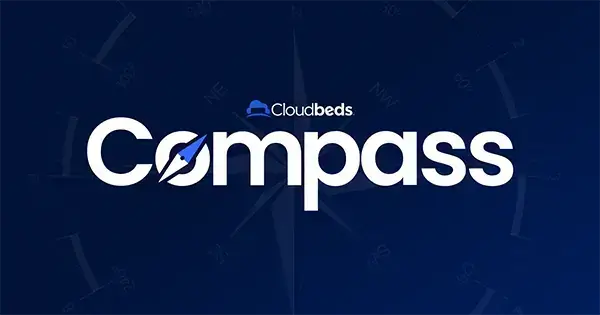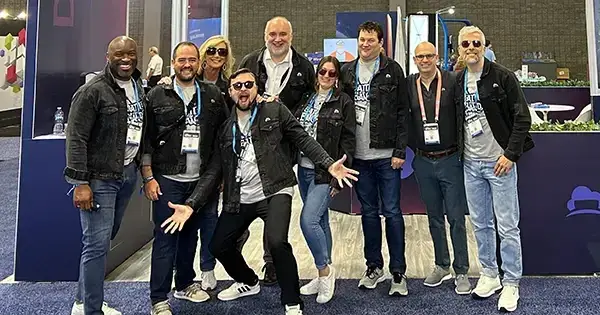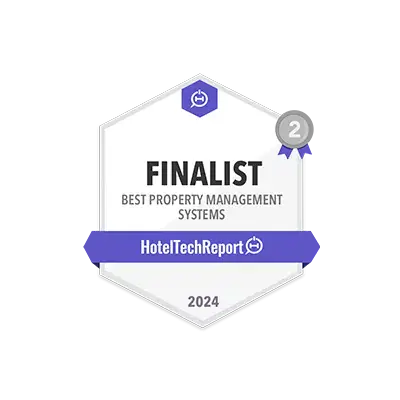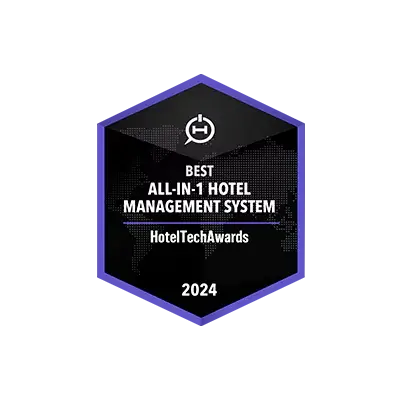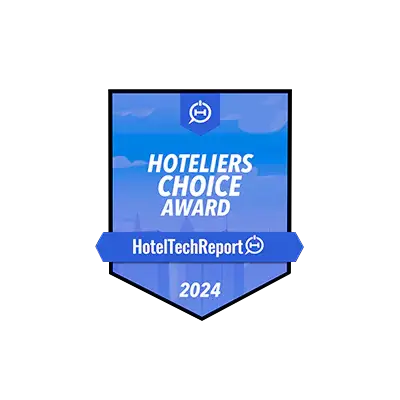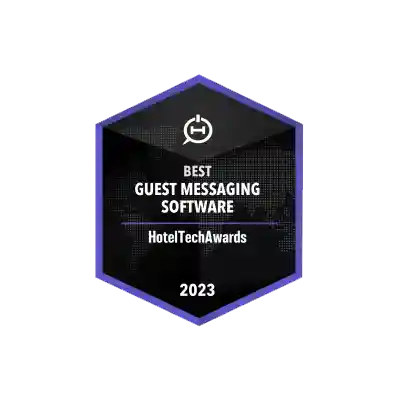
By Cloudbeds
From restaurants and lounges to spas and gift shops, hotels today offer a lot more than just a place to sleep. To effectively manage every point-of-sale (POS) on property, lodging operators must leverage technology.
One such piece of technology is a point-of-sale system. A POS system lets you quickly process and record transactions across your property to improve the guest experience, streamline operations, and conduct better revenue management.
Read on to learn more about the benefits of a hotel POS system, the features to look for, and how to integrate your system with your hotel management platform.
But first, listen to a clip from The Turndown to hear Jennifer Barnwell, President at Curator Hotel & Resort Collection, discuss how POS systems have evolved over the years and what she sees hotels adopting in 2024.
A point-of-sale system is a tool that facilitates order processing and payment transactions between hotels and guests. It combines software like an app with hardware like an iPad, cash register, touch screen, or card reader to accept payments. POS software plays an essential role in the hospitality industry, and the global POS software market is predicted to reach $19.56 billion USD by 2028. These systems help hoteliers consolidate sales across channels, facilitate payments, and ensure guest satisfaction. What is a POS system for hotels?
The importance of a POS system for hotels
While most of your revenue may come from room reservations, chances are you have additional sources of income (or points of sale) as well. These could include:
- Restaurant
- Bar
- Room-service
- Spa
- Gift shop
- Rentals
- Tours
- Transportation
A hotel POS system allows you to efficiently process transactions from every point of sale in one place. This is especially important as the use of cashless transactions rises; hotels need to be prepared to accept a variety of payment methods anytime, anywhere.
For example, if a hotel guest orders room service, books a massage, and participates in a city tour, wouldn’t adding those transactions to a single bill be easier than treating each separately? A POS system tracks and groups all the transactions made by each guest in one invoice so they can pay at checkout — streamlining the guest experience and increasing back-office efficiency.
Hotel POS vs. PMS
Hotels leverage various software solutions, and property management systems (PMS) and POS systems are both very important. The property management system is the heart of hotel operations and facilitates everything from guest reservations and inventory management to check-ins and housekeeping.
Connectivity between the PMS and POS for hotels is crucial as it helps streamling processes, ensuring that any transaction made across the property is reflected in the PMS. This enhances the guest experience by consolidating payments into one folio and gives hoteliers more detailed insights into guest spending habits.
12 benefits of POS systems for hotels
Without a POS system, your staff would have to add on-property charges to a guest’s folio by hand. These manual methods take up valuable time and leave room for error. Manual entries also prevent hospitality businesses from capturing data around guest spending patterns, which is critical for guest acquisition and marketing.
Today, a hotel’s POS can (and should) integrate with its existing tech stack, including its hotel management system, booking engine, channel manager, and revenue management system. This integration provides essential benefits for hotels, including:
1. Real-time synchronization
Your systems should be in sync in real-time so that communication flows from wherever a sale takes place on the property to the front desk so that staff are updated on every transaction.
2. Task automation
Automate manual POS processes to save your team time and improve efficiency across departments. Consider implementing self-ordering options for guests via apps, kiosks, or QR codes to further reduce your staff’s workload (plus, customers spend an average of 20% more when ordering themselves).
3. Data tracking
A POS solution tracks valuable customer data, such as sales patterns and guest preferences. This information lets you improve your hotel’s offerings and implement targeted marketing efforts.
4. Expanded service
With a mobile-friendly POS, your staff can take orders anywhere: by the pool, in the lobby, or at the spa. Wherever guests are, your team can maximize incremental revenue opportunities.
5. Upselling opportunities
Upsells represent a $28 billion opportunity for properties and are becoming an increasingly important part of a hotel’s revenue management strategy. Your POS system can display personalized recommendations of services as add-ons by using your guest data.
6. Seamless guest experience
Guests expect a seamless experience from large and small businesses alike; they don’t want to carry a payment method while roaming the property or have to use a specific credit card to make purchases. Hotels must use a POS to add guest expenses to a single folio automatically, so they only pay once (using their preferred payment method) at checkout.
7. Real-time inventory management
From merchandise in your gift shop to food and beverage stock levels, understanding when goods need to be replenished is crucial to seamless operations. A POS can help manage inventory in real-time, preventing stockouts and overstock situations.
8. Increase loyalty
A POS can help support loyalty programs for both guests and non-guests. If you have an on-site bar or restaurant, for example, you can track purchases and reward repeat patrons with personalized offers and services to foster loyalty.
9. Improved billing
POS systems reduce the possibility of errors produced by manual reconciliation, which results in faster service and more accurate billing.
10. Streamlined transactions
Streamline transactions by allowing guests to pay with their preferred method of payment (EMV and other credit or debit cards, cash, gift cards, bank transfers, checks, digital wallets, mobile payments, etc.).
11. Useful reports
A POS system surfaces new insights about guest behavior. Since you can view a guest’s spending on a single folio, you can determine which guest profiles are the most profitable and which channels deliver higher-spending guests. Using this information, you can invest in marketing and distribution efforts that yield greater profitability. Reporting also makes accounting responsibilities more accessible and efficient.
12. Improved security
POS systems help improve safety by encrypting payment data and recording every transaction, which can be helpful in the event of theft or fraud.
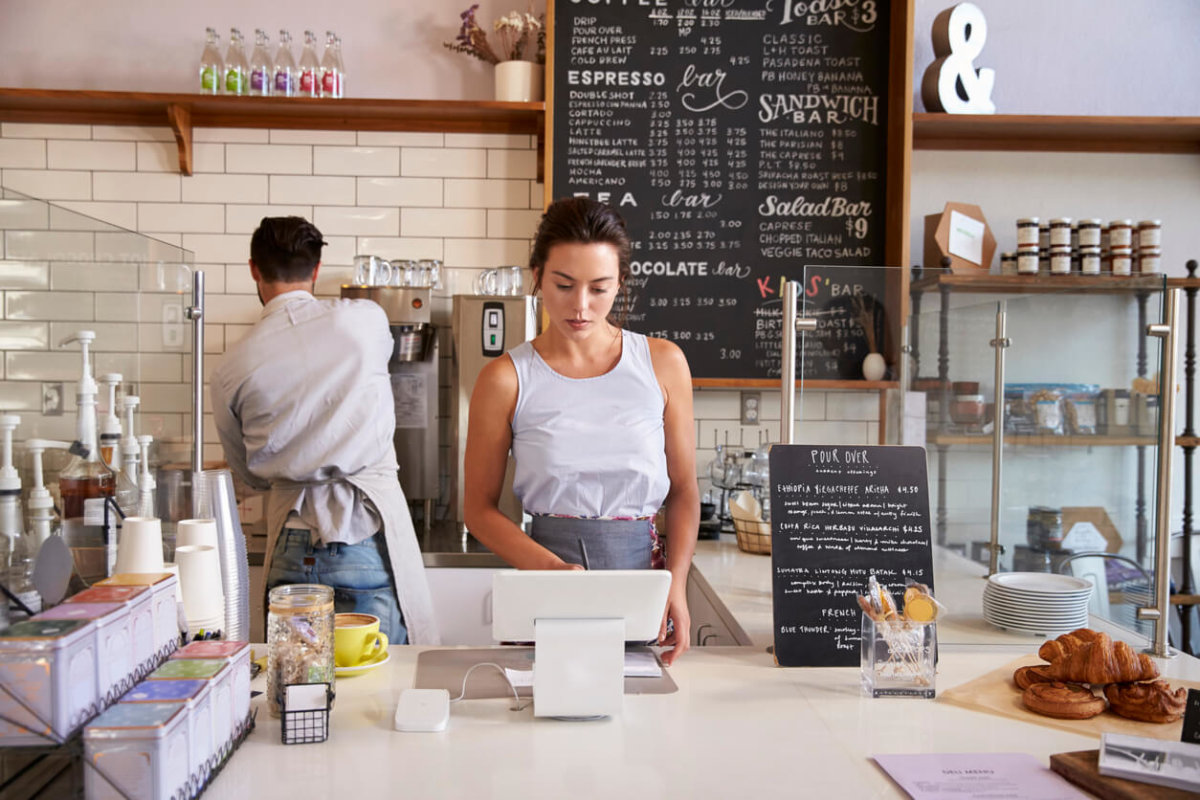
Types of POS systems
Finding the right POS system for your hotel is crucial for efficiency and a seamless guest experience. Over the years, POS systems have become much more user-friendly, portable, and affordable – giving hoteliers flexibility and choice when delivering ancillary services for guests. POS systems fall into two categories:
Legacy-based POS systems
Also known as traditional POS systems, legacy systems need software to be installed on a computer system that saves data on a local server. They require a significant investment (license and POS hardware), more training than other systems, and can be challenging to update with new features. Even though legacy POS systems can process payments offline, you can’t access them from other servers or devices.
Cloud-based POS systems
Cloud-based POS systems store data in the cloud instead of on local devices or servers and can be accessed anywhere. They have inventory management, payment processing, and reporting features and can easily integrate with other systems. Since they’re cloud-based, these POS systems have automatic updates and upgrades that keep the technology fresh and up to date.
Different types of POS tools include:
Mobile POS systems
A mobile POS system is a portable point-of-sale system that can be an independent mobile app. It runs on hardware like tablets or smartphones, making it more accessible for staff across a property. This system allows you to check inventory and stock levels, make personalized recommendations, and charge guests on the spot.
Kiosk POS Systems
Kiosks or self-service POS systems are designed for a contactless experience. Since they have scanners and card readers, guests can check in and out and make contactless payments through booths. Although these systems are a great alternative to the traditional front desk, installation and maintenance can be expensive, and staff are usually still required on-site to help guests navigate the system.
Terminal or desktop POS systems
Terminal or desktop POS systems require a terminal, such as a cash register, to record data into the POS software and perform transactions. Although they are the most common type of POS system, they require staff time and manual reconciliation.
Multichannel POS systems
Multichannel POS systems integrate sales across multiple channels, including mobile, kiosks, and in-person, providing a seamless experience for guests. For hotels, multichannel systems allow guests to order room service or dine in the restaurant, shop merch online and in-store, buy drinks at the pool, or secure a bike rental online.
POS hardware components
POS systems also require different types of hardware depending on a hotel’s specific needs. Hardware can include:
- Barcode scanners and printers
- Cash drawers
- Tablets
- Card reader
- Receipt printer
- Kitchen display system
- Customer-facing display
- Terminals
- Signature capture pads
Features to look for in a POS system
Choosing the right POS system can be tricky. Ensure your POS system includes essential functions such as invoicing, order customization, and billing. In addition, consider the following features:
PMS integration
According to Hospitality Tech’s 2023 POS software trends report, integration is one of the key features driving POS purchases. A hotel PMS integration simplifies billing for both yourself and the guest and delivers more insightful data for decision-making.
Inventory management
Your POS system should be able to track stock levels and send alerts when quantity drops below a certain threshold to ensure that you never run out of product.
Payment processing
You should be able to support a variety of payment options with your POS system and offer the possibility to conduct multi-payment transactions to split bills.
Mobile capabilities
You’ll limit your use cases if your chosen POS system doesn’t provide a full-featured mobile experience. Sometimes it’s not realistic or feasible to install POS terminals; a mobile POS gives your employees flexibility in how they serve guests.
Cloud-based
If you use a cloud-based PMS, opt for a cloud-based POS system. It is less expensive and more reliable than on-premise systems that require steep upfront investments, ongoing maintenance, and extensive training.
Fair pricing
Choose a POS vendor with fair and transparent pricing that reflects the features and functionality your business needs.
Loyalty tools
If you want to encourage customer loyalty to your restaurant or other points of sale, you should look for a POS system with built-in loyalty program tools to encourage repeat business.
Ease of use
With the amount of turnover in the hospitality industry, you don’t want to spend too much time and money training your staff. Your POS system should have an intuitive, user-friendly interface that your staff and guests can easily use.
Data protection
Since POS systems contain sensitive data such as account numbers or credit card information, they should include security measures to protect your hotel’s information from unauthorized access and data breaches.
Customer support
Hotel operations are conducted day and night, with guests ordering room service or staying late at the bar. You must work with a provider that offers 24/7 support and can help resolve issues quickly.
Robust reporting
Reporting is a key component of any POS system. Your system should provide a dashboard with a detailed look into your revenue streams with data backed by your PMS. Insights into key metrics on inventory, sales activity, and employee performance will help inform your future business decisions.

11 leading hotel POS systems
The following are 11 of the best hotel POS systems that offer comprehensive functionality and receive high ratings on platforms such as Softwareadvice, Capterra, and Trustpilot.
1. Cloudbeds
Discover the simplicity and efficiency of Cloudbeds POS, transforming your smartphone into a point-of-sale terminal. This solution is perfect for properties looking for a simple POS without the extra hardware.
Cloudbeds also integrates with the following POS systems.
2. GlowPOS
Elevate guest service quality with GlowPOS, a solution that integrates seamlessly with self-service kiosks, digital menus, and mobile ordering.
3. Infrasys POS
Infrasys Cloud POS offers the flexibility and scalability to provide a seamless digital guest experience across a hotel’s F&B outlets, driving revenue and enhancing operational efficiency.
4. INVUPOS
INVUPOS is a cloud-based POS solution that offers hoteliers comprehensive and easy-to-use tools to simplify selling and information gathering.
5. Last.app
Last.app is an all-in-one restaurant software solution that includes a restaurant POS system, delivery integrators, an online store, reservations, and more.
6. Lightspeed
Lightspeed is a cloud-based POS provider offering a complete hotel restaurant technology suite. It helps you verify a guest’s occupancy status and add restaurant charges to their room.
7. Poster
Poster’s cloud-based POS system combines solutions for the front office, onsite restaurants, inventory, finances, analytics, and CRM.
8. Revo
Revo is a POS software solution that consists of a web-based back-office for business configuration and an iOS-native app for operational use across hotels.
9. Tabology
Tabology is an integrated cloud technology suite that includes EPOS, stock management, staff scheduling, booking, deposit handling, and online ordering on mobile devices.
10. Tevalis
Tevalis is an award-winning EPOS that can be adapted to multiple areas across a hotel venue, such as FnB, leisure, and retail, through to an integrated PMS.
11. Toast
Toast is a POS system uniquely designed to meet the needs of hotel restaurants. With robust PMS integrations, Toast empowers lodging operators to streamline operations, increase revenue, and deliver great hospitality with a best-in-class room charge experience for guests and staff.
How does a POS system work with Cloudbeds?
Cloudbeds seamlessly integrates with a variety of POS systems to provide hotels with real-time data synchronization and transaction processing from the point of sale, increasing the speed of service.
The POS system validates guest information within Cloudbeds’ PMS (name, room number, etc.) and then adds every transaction or charge to their folio. The guest can then see these transactions at the end of their stay in a single invoice and pay during checkout.
Marina Moretti, Founder and Co-Owner of Ô de Casa, São Paulo’s first hostel, says of the Cloudbeds and Glow POS integration,

With Cloudbeds Insights, a hospitality-focused business intelligence solution, data from your POS and other tech systems come together to provide insights into performance. From understanding what offerings are most popular with guests to the most common payment methods, hoteliers are backed with the information needed to make data-driven decisions.
Deliver seamless experiences
Investing in a modern point-of-sale empowers your staff to deliver a seamless experience on par with large chains. In addition to an improved guest experience, you’ll gain operational precision to make more accurate, data-backed decisions. It’s a win (and a necessity) for properties that sell more than just room to guests.

